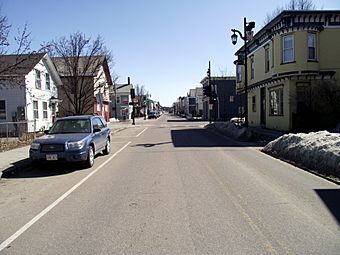North Street Historic District (Burlington, Vermont) facts for kids
Quick facts for kids |
|
|
North Street Historic District
|
|
 |
|
| Location | Roughly along North St., from North Ave. to N. Winooski Ave., Burlington, Vermont |
|---|---|
| Area | 24 acres (9.7 ha) |
| Built | 1823 |
| Architectural style | Italianate, Queen Anne |
| NRHP reference No. | 01001364 |
| Added to NRHP | December 21, 2001 |
The North Street Historic District is a special area in Burlington, Vermont. It's like a time capsule showing how the city's Old North End neighborhood grew. This district stretches for ten blocks along North Street. For over 150 years, it has been the main shopping and business area for the people living nearby. It was added to the National Register of Historic Places in 2001 because of its important history.
Contents
What Makes the North Street Historic District Special?
This historic district covers about 24 acres. It includes 70 buildings, most of which face North Street. A few buildings are also found on nearby streets like North Avenue and Elmwood Avenue.
Most of the buildings are one or two stories tall. They are used for shops or a mix of shops and homes. Many of these buildings were built between 1870 and 1890. This was a time when the area was growing very fast. Some buildings are even older, from the 1830s, and some are newer, from the 1940s.
A Look Back: How the District Grew
Burlington's Old North End neighborhood started as a place for homes in the early 1800s. It grew very fast in the mid-1800s. This growth happened because Burlington had a big lumber industry. Many immigrants came to the city to work in the lumber mills.
North Street, which runs from the waterfront of Lake Champlain, became the main street for businesses. Even though it started with mostly homes, shops began to appear by 1853.
People Who Shaped the Area
Early immigrants to this area were mainly from French Canada and Ireland. Later, in the late 1800s and early 1900s, many Jewish immigrants from Europe arrived. These new arrivals often lived in tenement houses. Some people moved out when they earned enough money. Others stayed and created close-knit communities with people from their home countries.
Buildings and Styles You'll See
The buildings in the district show different architectural styles. These styles were popular when the buildings were constructed. You can see examples of Italianate and Queen Anne styles. These buildings help tell the story of how the neighborhood changed and grew over time.



